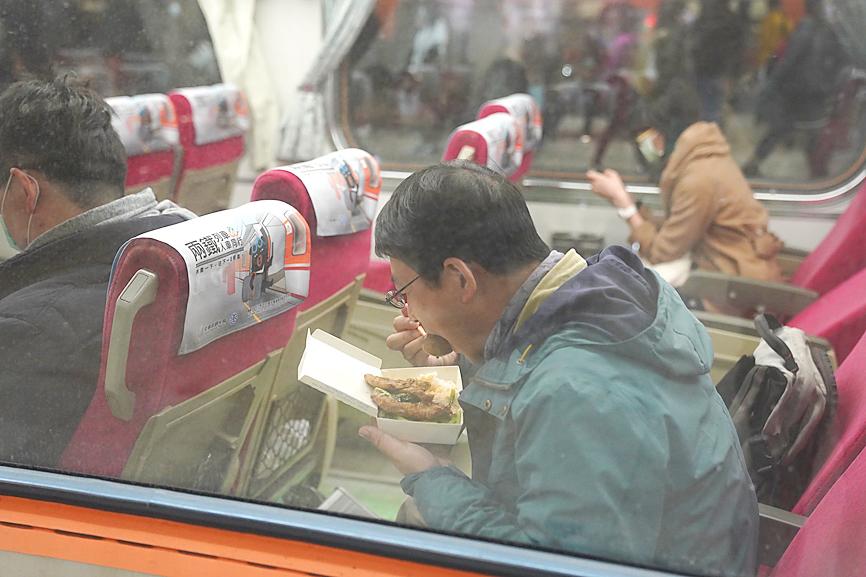Despite a surge in local COVID-19 cases, railway passengers can still eat and drink onboard, Minister of Transportation and Communications Wang Kwo-tsai (王國材) said yesterday.
Wang was responding to questions on whether food and beverage consumption would be prohibited on Taiwan Railways Administration (TRA) and Taiwan High Speed Rail Corp (THSRC) trains, as COVID-19 infections have risen dramatically since the beginning of this month.
Wang said the ministry has no plans to reimpose a ban.

Photo: CNA
“Railway passengers should still be allowed to eat and drink onboard as long as they observe disease prevention guidelines. Otherwise, people on four-and-a-half-hour or longer trips would be starving,” he said.
In other news, Wang denied that the TRA and THSRC would soon raise fares.
The Ministry of Transportation and Communications last week approved THSRC’s proposal to raise the basic rate from NT$4.134 per passenger-kilometer (pkm) to NT$4.313 per pkm.
The adjustment, which was made in response to the rise in Taiwan’s consumer price index, would raise one-way fare from Taipei to Kaohsiung from NT$1,490 to NT$1,630.
Local Chinese-language media have reported that the TRA would follow suit, with the price for a one-way ticket from Taipei to Kaohsiung costing more than NT$1,000.
“THSRC is a publicly listed firm, and we will respect its board of directors’ decision. If the board votes to raise ticket prices, the pricing scheme would still have to be approved by the transport ministry, which holds 43 percent of the company’s shares,” Wang said.
There had been instances in which the board voted against a price hike, although the ministry had approved a basic rate hike.
Wang told a meeting of the legislature’s Transportation Committee that he would ask the board directors representing the ministry to not support the plan to increase fares.
“The focus of the TRA’s reform is to enhance safety and service punctuality. Unless the TRA substantially improves on both fronts, we will not talk about plans to raise fares,” he said.
TRA Director-General Du Wei (杜微) said the agency has tasked a consulting firm to stipulate a new formula for calculating ticket prices, but it does not plan to raise fares at the moment.

RESOLUTIONS DEBATE: Taiwan’s allies said that UN and WHA resolutions cited by China and other nations ‘do not determine Taiwan’s participation in WHO activities’ A proposal to invite Taiwan to this year’s World Health Assembly (WHA) was rejected on Monday, resulting in Taipei’s absence from the annual meeting for a ninth consecutive year, although partners spoke up for Taiwan’s participation at the first day of the meeting. The first agenda item after the opening was a “two-on-two debate” on a proposal to invite Taiwan to participate at the WHA as an observer. Similar to previous years, two countries made statements in favor of the proposal, while two others expressed their opposition. Philippine Secretary of Health Teodoro Herbosa, president of the 78th WHA, accepted the WHA General Committee’s

Palauan President Surangel Whipps Jr arrived in Taiwan last night to kick off his first visit to the country since beginning his second term earlier this year. After arriving at Taoyuan International Airport at around 6:30 pm, Whipps and his delegation were welcomed by Minister of Foreign Affairs Lin Chia-lung (林佳龍). Speaking to gathered media, the Palauan leader said he was excited and honored to be back in Taiwan on his first state visit to Taiwan since he was sworn in this January. Among those traveling with Whipps is Minister of State Gustav N. Aitaro, Public Infrastructure

Premier Cho Jung-tai (卓榮泰) on Friday laid out the Cabinet’s updated policy agenda and recapped the government’s achievements ahead of the one-year anniversary of President William Lai’s (賴清德) inauguration. Cho said the government had made progress across a range of areas, including rebuilding Hualien, cracking down on fraud, improving pedestrian safety and promoting economic growth. “I hope the public will not have the impression that the Cabinet only asked the legislature to reconsider a bunch of legal amendments,” Cho said, calling the moves “necessary” to protect constitutional governance and the public’s interest. The Cabinet would work toward achieving its “1+7” plan, he said. The

Nvidia founder and CEO Jensen Huang (黃仁勳) hosted a dinner in Taipei last night with key Taiwanese suppliers to celebrate the successful mass production of the company’s new Blackwell AI systems. Speaking to the media earlier yesterday, Huang thanked Nvidia’s Taiwanese partners for their contributions to the company’s ecosystem, while also sharing his plans to meet with Taiwan Semiconductor Manufacturing Co (TSMC) founder Morris Chang (張忠謀). In response to rumors that Nvidia will launch a downgraded Hopper H20 chip for China in July, Huang dismissed the reports, saying, “That is not true.” He clarified that there